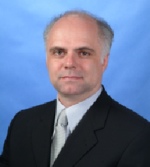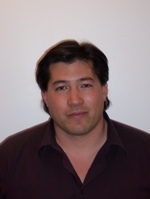Intelligent Robots Evolving
Category: Artificial Intelligence
Adaptive behaviors evolve rather indirectly. If you look under the hood of a car you can see the physical mechanisms that convert exploding fuel into forward motion, and it all makes sense. Each part has an obvious, engineered role. But...
Posted by Greg Laden at 12:04 PM • 2 Comments • 0 TrackBacks

 Greg Laden is a blogger, writer and independent scholar who occassionally teaches. He has a PhD from Harvard in Archaeology and Biological Anthropology, as well as a Masters Degree in the same subjects. He is a biological anthropologist, but for many years before going to graduate school to study human evolution, he did archaeology in North America. He thinks of himself as a biologist who focuses on humans (past and present) and who uses archaeology as one of the tools of the trade. Greg blogs regularly on ScienceBlogs at http://www.scienceblogs.com/gregladen/.
Greg Laden is a blogger, writer and independent scholar who occassionally teaches. He has a PhD from Harvard in Archaeology and Biological Anthropology, as well as a Masters Degree in the same subjects. He is a biological anthropologist, but for many years before going to graduate school to study human evolution, he did archaeology in North America. He thinks of himself as a biologist who focuses on humans (past and present) and who uses archaeology as one of the tools of the trade. Greg blogs regularly on ScienceBlogs at http://www.scienceblogs.com/gregladen/. Dr. Joseph J. Salvo attended Phillips Andover Academy, received his A.B. degree from Harvard University and his Master and Ph.D. degrees in Molecular Biophysics and Biochemistry from Yale University. Dr. Salvo joined the GE Global Research Center in 1988. His early work focused on the development of genetically modified bacteria and fungus, for the production of novel high performance polymers. In the mid 1990's he turned his group's efforts towards developing large-scale internet-based sensing arrays to manage and oversee
business systems. Most recently, he and his team have developed a number of complex decision engines that deliver customer value through system transparency and knowledge-based computational algorithms. Commercial business implementations of his work are currently active in Europe, and Asia as well as North and South America.
Dr. Joseph J. Salvo attended Phillips Andover Academy, received his A.B. degree from Harvard University and his Master and Ph.D. degrees in Molecular Biophysics and Biochemistry from Yale University. Dr. Salvo joined the GE Global Research Center in 1988. His early work focused on the development of genetically modified bacteria and fungus, for the production of novel high performance polymers. In the mid 1990's he turned his group's efforts towards developing large-scale internet-based sensing arrays to manage and oversee
business systems. Most recently, he and his team have developed a number of complex decision engines that deliver customer value through system transparency and knowledge-based computational algorithms. Commercial business implementations of his work are currently active in Europe, and Asia as well as North and South America. Dr. Peter Tu received his undergraduate degree in Systems Design Engineering from the University of Waterloo, Canada, and his doctorate from Oxford University England.
In 1997, he joined the Visualization and Computer Vision Group at the GE Global Research Center in Niskayuna, NY. He has developed algorithms for the FBI Automatic Fingerprint Identification System. He is the principle investigator for the ReFace program, which has the goal of automatically computing the appearance of a person’s face from skeletal remains. Dr. Tu has also developed a number of algorithms for the precise measurement of specular and high curvature objects. His current focus is the development of intelligent video algorithms for surveillance applications.
Dr. Peter Tu received his undergraduate degree in Systems Design Engineering from the University of Waterloo, Canada, and his doctorate from Oxford University England.
In 1997, he joined the Visualization and Computer Vision Group at the GE Global Research Center in Niskayuna, NY. He has developed algorithms for the FBI Automatic Fingerprint Identification System. He is the principle investigator for the ReFace program, which has the goal of automatically computing the appearance of a person’s face from skeletal remains. Dr. Tu has also developed a number of algorithms for the precise measurement of specular and high curvature objects. His current focus is the development of intelligent video algorithms for surveillance applications.


